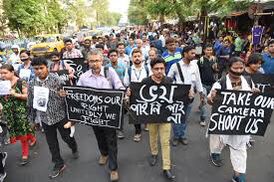Over 35 journalists in IIOJK have been illegally forced to police inquiry, raids, threats, physical abuse, and limitations on freedom of movement, or false criminal charges since August 2019 as consideration for their reporting. Following the announcement of a “new media policy” by the Indian government in June 2020, which made it easier for the Indian government to limit media in the region, this ongoing harassment of journalists became increasingly intense. The new media policy gave the Indian government more authority to keep surveillance on journalists and media organizations for any information, news, or broadcasting operations that don’t support IIOJK or Indian interests. The Indian military and police have become more aggressive in their harassment, intimidation, and abduction of Kashmiri journalists as a result of the strict media policy. Since 2019, the Indian government has put over 450 Kashmiri reporters, advocates, politicians, human rights activists, academics, and businessmen on its “No Fly List” without a court warrant.
Ahsan Untoo, a well-known human rights supporter, was detained on contrived and bogus allegations. Following the submission of his evidence under the Universal Jurisdiction application before UK-based legal firm Stoke White for claimed torture, Muhammad Ahsan Untoo, a human rights activist and chairman of the International forum for Justice and Human Rights (IFJHR), was arrested under the anti-terrorism statute UAPA. According to law firm Stoke White, it provided the War Crimes Unit of the Metropolitan Police with voluminous evidence on January 19, 2022, showing how Indian forces led by Gen. Manoj Mukund Naravane and Home Affairs Minister Amit Shah were responsible for the brutal treatment, kidnapping, and murder of activists, journalists, and civilians. The Unlawful Activities (Prevention) Act, which authorizes the identification of any person as a terrorist without requiring proof of membership or affiliation with banned groups, has drawn the ire of UN experts on several occasions. In Jammu and Kashmir, which is administered by India, the Act is used as a tool of coercion against people from civil society, journalists, and human rights supporters.
The expert demanded the release of the Kashmiri human rights activists and the outcome of the investigations regarding them. Ahsan Untoo’s incarceration is a part of the apartheid regime headed by Modi’s strategy to silence rights advocates who have repeatedly played a key role in raising concerns about the human rights conditions in IIOJK and denouncing the fascist dictatorship’s harsh policies against Kashmir. A draft communiqué that was submitted to the Indian government on April 3, 2023 by the UN Special Rapporteur on Enforced Disappearances, Human Rights Defenders, Freedom of Expression, and Inhuman Treatment was made public. Human rights activist Muhammad Ahsan Untoo drew concerns from the UN special rapporteur on human rights on his arrest and alleged mistreatment. The enforcement of the Unlawful Activities Prevention Act (UAPA), a counter-terrorism statute, against human rights activists as a basis for their arbitrary detention and mistreatment, also raised concerns for the Special Rapporteur.
In a similar manner, Amnesty International said that, in the three years after the change in the region’s status, the Indian government has dramatically increased the suppression of human rights in Jammu & Kashmir. “By harassing and intimidating critical voices, authorities are targeting all credible, independent sources of information in and about Jammu and Kashmir. There is a silence achieved on all dissent through heavy handed repression which has spread fear and uncertainty in the region,” stated in news brief.
Since August 2019, Amnesty International has documented at least 60 cases of persecution of journalists and human rights activists. Many journalists, notably Fahad Shah, Aasif Sultan, and Sajad Gul, have been arrested repeatedly. They have a history of being jailed indefinitely after being arrested under one statute, being given release by the court, and then being promptly detained again under the Unlawful Activities (Prevention) Act (UAPA), Jammu and Kashmir’s main anti-terror law.
Following the adoption of restrictive media laws like the 2020 Revised Media Policy and the 2021 Film Policy, the Indian government now has complete control over information that leaves the area. The Indian government continues to frequently stopped internet access in various parts of Kashmir after an initial 18-month internet blackout. Additionally, the Indian government’s unexpected and forceful shutdown of the Kashmir Press Club in 2022 caused a severe damage to the already ailing media industry. The international human rights organizations ought to pay attention to the situation and take the appropriate action to secure the release of all human rights workers who have been detained in IIOJK on fictitious and false accusations.






